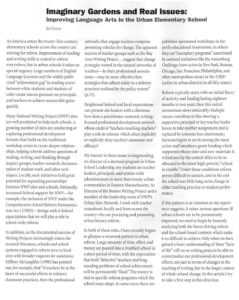Imaginary Gardens and Real Issues: Improving Language Arts in the Urban Elementary School
Excerpt
I offer three connected approaches to permanently improving literacy education in urban elementary schools: first, a portrait of an imaginary, composite urban school—East Elementary—that illustrates some of the reasons why lasting change is so difficult to achieve; second, consideration of some relevant research findings concerning reform and language arts instruction; third, suggestions for a new way to think about change. My purpose in this three-pronged focus is to highlight implementation issues that occur in schools when outsiders—reform experts, university faculty, content-area “coaches”—attempt to work closely with insiders—teachers and principals—to create lasting change. If such collaborations are ever to succeed, I believe we must shift the focus of effort from exemplary programs created by outside agents and supported by short-term funding, to the creation of exemplary contexts, the set of conditions that will allow a particular school with a unique history and faculty to integrate outside interventions into a process of sustainable success on its own terms.


